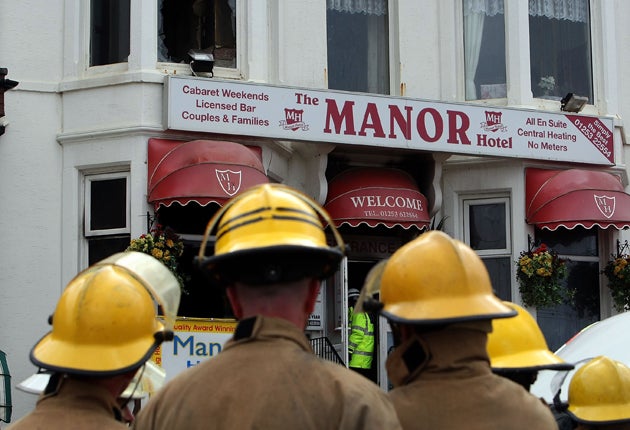Hotel owners to be named and shamed over fire safety
Fire Service leaders plan to make public the names of those who put lives at risk with blocked exits and stairways and faulty smoke alarms

Your support helps us to tell the story
From reproductive rights to climate change to Big Tech, The Independent is on the ground when the story is developing. Whether it's investigating the financials of Elon Musk's pro-Trump PAC or producing our latest documentary, 'The A Word', which shines a light on the American women fighting for reproductive rights, we know how important it is to parse out the facts from the messaging.
At such a critical moment in US history, we need reporters on the ground. Your donation allows us to keep sending journalists to speak to both sides of the story.
The Independent is trusted by Americans across the entire political spectrum. And unlike many other quality news outlets, we choose not to lock Americans out of our reporting and analysis with paywalls. We believe quality journalism should be available to everyone, paid for by those who can afford it.
Your support makes all the difference.Chief fire officers are set to name and shame the British hotel owners who put guests' lives at risk by flouting safety laws.
Lists of owners who jeopardise the lives of holidaymakers and others by failing to take appropriate fire precautions in their buildings are to be made public.
The Independent on Sunday revealed last week that fire authorities across the country have issued thousands of prohibition and enforcement notices to hotels and guest houses after inspections revealed safety failings, many of them potentially lethal. Poorly maintained smoke alarms, blocked fire exits and stairways and inadequate staff training were among the faults discovered by fire inspectors.
Experts warn that too many hoteliers remain ignorant of or are flouting their responsibilities for fire safety. Now they are proposing to name those who fail to act after being issued with enforcement or prohibition notices. They believe exposing the worst offenders will help the public avoid potential death traps.
The Chief Fire Officers Association, which represents Fire Service leaders across the UK, said it plans to have a national database, listing offenders and accessible to the public, up and running by early next year.
Shaun Higson, station commander at Greater Manchester Fire and Rescue Authority, part of the committee that has developed the scheme, said: "The public are taking fire safety quite seriously. This is a good way in helping with that. We already get people ringing us up and saying, 'We're coming to Manchester next week, can you tell me if such and such a building is safe?'"
He said the Fire Service had also noted a trend for people to take smoke detectors on holiday with them.
The service had identified "major problems" among small, independent hotels and in self-catering holiday homes. "That is where the fire safety problems are beginning to show themselves, as opposed to the big, national chains. Smaller places may not prioritise fire safety as much as they ought to," Mr Higson added.
The British Hospitality Association said it welcomed the name-and-shame move. Its spokesman, Miles Quest, said: "We don't have too much sympathy with places that don't abide by the law. Clearly fire safety is desperately important and, since the change in the Fire Safety Act a few years ago, it's now up to the hoteliers to check the property themselves. If they don't do it then they open themselves up to some severe penalties."
He admitted some hoteliers faced difficulties: "It is always a problem for the smaller guesthouses and hotels. Some of the requirements are quite onerous and in some cases one or two have had to close. Most of our members have begun to comply. The problem is there are 50,000 hotels and guesthouses and some are quite small. Some of them might not have known there was a change in the law."
A spokesperson for the Chief Fire Officers Association said: "There is a trial where we are examining how best to share key information on enforcement action. Clearly there are issues around ensuring this information is managed in an appropriate way, and this needs to be balanced with the need of people to understand how the order can be contravened and the type of enforcement action authorities will take to reduce risk.
"If the trials are successful we anticipate the database being up and running in six months."
Join our commenting forum
Join thought-provoking conversations, follow other Independent readers and see their replies
Comments